When I was little, I remember my dad explaining our relatives to us: “She’s my cousin, twice removed.” It’s an expression that talks about a relationship that is a bit more distant. Today I want to talk about our neighbours, once removed. Why is it easier to hurt people when they are removed from us? What does it mean to be a Christian when so many of our neighbours are once removed?
The story of David and Uriah is a story of a neighbour once removed. David commits adultery with Uriah’s wife, Bathsheba. Uriah is a man who is loyal to King David, who has fought valiantly for him. In the book of 2 Kings, Uriah is listed as one of David’s 30 great warriors. David can’t bring himself to commit cold-blooded murder, so he conspires with General Joab to have Uriah put at the forefront of the fighting. He instructs Joab to abandon him to the Ammonites, to pull back the other soldiers, and leave him to be killed.
In David’s mind, this is not murder. He didn’t push the spear into Uriah’s heart, it was the Ammonites who did it! Soldiers are always dying in the line of duty. When David hears of Uriah’s death he says, “The sword devours now one and now another.” He deflects guilt about this murder from himself to the weapon of the sword, to war itself. It’s violence once removed, towards a neighbour once removed—so much easier on the conscience. There is no blood on David’s hands, or so he thinks.
At the end of the day, Nathan the prophet comes with the message from God that David has displeased the Lord. David has done the wrong thing. Violence once removed towards the neighbour once removed is still violence in God’s eyes. It is still a sin.
It’s a sin that is so easy to commit, because sinning against our neighbour once removed just doesn’t feel so bad. We know that on a personal level.
Words can injure
Think about people in our workplace or neighbourhood. Even if we are mad at them, we hold back and don’t say hurtful things to their face. But it is very easy to tell other people what we really think about them. You can call this activity by a lot of names: bad-mouthing, backbiting, backstabbing, belittling, casting aspersions, defaming, gossiping, libelling, muck-raking, mud-slinging, slamming, slandering, vilifying. We have a lot of works in the English language to describe saying bad things about someone once removed! I think we have that many words because we do it so often.
And we’ve all done it. We say something nasty about someone, or we write a snarky comment on a Facebook page. “We’re just getting it off our chest;” “We’re just letting off some steam.” But the words are like a hot potato or a bomb, they get passed quickly from person to person, not hurting anyone who passes them on, until they reach the person they are about, and it’s there that they explode. BANG! We all have been on the receiving end of a gossip bomb.
If we’ve done the gossiping, and the person comes to us with their hurt feelings, we stammer out an apology, that usually goes; “I never meant for you to hear that.” And you know truly that you would never have said that to someone’s face; it’s not in your character to do that, to openly push the spear of a naked insult into someone’s heart. But the deed is done, and it’s done to the neighbour once removed. It’s easier to hurt people when you don’t look them in the eye.
Scripture reminds us to watch our actions; to carefully monitor our tongue, because words are like a raging fire. We need to be careful about the tiniest sparks that come out of our mouths. That is our responsibility, as surely as it is our responsibility not to throw a match into a forest in a dry summer. We may not mean to burn down our local conservation area, but if we are careless about a match, that is exactly what could happen.
Killing at a distance
What about hurting our neighbour once removed on a more global level? I recently read a book called On Killing by Lieutenant Colonel Dave Grossman, a psychologist who has worked with veterans in the United States. Through his work he has discovered that there is an innate quality in human beings that prevents us from killing each other.
He observes that while violence between people happens, it is not the norm. Everyone does not kill everyone all the time or the human race would not have survived this long. We may not love our neighbour, but we don’t want to kill our neighbour, most of the time.
Grossman explains studies done of Civil War battles in the United States. In the 1800s soldiers lined up on fields and just shot at each other at close range. Studies have shown that hundreds of people should have been killed each minute, but instead only one or two people were killed each minute, prolonging battles for hours and even days. The simple fact is that when faced with the body of an enemy, most people will not aim at that body, they will aim above it. They will try to scare their opponent away rather than shoot them dead.
What made a difference in the Civil War were cannons, because a cannon is operated by a team of people, which changes the personal dynamic of the weapon. It is able to kill many people at once; from further away. The army soon learned that the enemy once removed is easier to kill than the enemy near at hand. It’s not surprising that weapon development has always tended in the direction of weapons that kill more people from further away.
In August 1945 an atomic bomb was dropped on Hiroshima in Japan. It was one of the most effective weapons ever used on our neighbour once removed. Hiroshima was a city of around 350,000 people. The American B-29 bomber the Enola Gay, piloted by Paul Tibbets, was 31,000 feet over the city when it dropped the bomb, which contained 64 kilograms of uranium. The plane was 11 miles away before it felt the shock of the bomb going off. Up to 100,000 people were killed within the first day from radiation, burns, and the explosion, and probably an equal number died in the following months and years from radiation sickness. That is a lot of destruction; destruction on a bigger and more devastating scale than had ever been perpetrated in such a short period of time.
Now it is not the first time, nor would it be the last time, that 200,000 people were killed in the world. In six years, Hitler killed millions of Jews in gas chambers. Stalin killed millions in a two year period in the Ukraine in the 1930s with a policy of starvation by simply removing almost all the food from a geographic area. In Rwanda in 1994, Hutus killed 800,000 Tutsis in a six month period, mostly with machetes.
There are blood-soaked windows in the history of the world, but in each of these last three cases, there were people who saw what they did. In Rwanda it’s clear, you don’t get much closer than the end of a machete. In terms of the gas chambers, someone who was following orders heard the screams, and cleared the bodies. In the Ukraine the people who were charged with carting away the food saw the skeletal bodies lying on the roadside. We do violence to our neighbours close at hand. But when we do that, there is a cost, a psychological cost to that violence because we have witnessed the destruction we have caused.
What is most troubling in modern warfare is that we are becoming more and more removed from the victims of war. We have fighter jets that can drop bombs on people from kilometres in the air. As Canadian taxpayers, we buy fighter jets. It seems very removed from us. I personally have never seen a crater created by a bomb that Canadians have dropped. I have never seen a list of people killed by Canadian bombs. The crew that drops bombs or fires missiles never visits the site to see the destruction they caused, and the grieving families. It is our neighbour once removed. It’s easy; we are just following orders, we’re just paying taxes.
Power of darkness
The writer of the letter to the Ephesians talks about the cosmic powers of this present darkness. When I try to understand what that means today, in our world, I think about the darkness that comes over us when we fail to see our own responsibility for the violence of wars. There are forces conspiring to keep the public in the dark, to not let us see what we are doing, to not see that there is blood on the hands of Canadians. We don’t declare war, we just send troops and fighter jets and we never get the butchers bill from that. We say we don’t have responsibility, “the sword devours now one and now another.” There’s nothing we can do about it, it seems. We are in the dark. And it’s getting darker.
Recently if you’ve followed the news, you may have seen some debate about the ethics of drone warfare. A drone is an unmanned aircraft that monitors and can deliver a missile to a remote location. Drone warfare is increasingly popular in the war against terror. At least we call it “the war against terror.” From the perspective of the people on the receiving end, it is terrorism itself.
In our world we have courts of law; if someone threatens you, you bring them before a court and charge them, they are tried by judge and jury, and a punishment is given if they are found guilty. This works within countries, but also to some degree between countries, with extradition treaties and international courts to bring criminals to justice.
What the United States is increasingly doing is bypassing the extradition process and international law (they say it is ineffective), and looking for the people they say are the bad guys, and just murdering them in their homes in other countries with these drones.
The argument for the drones is that they are very good at what they do. The drones monitor the compound of a terrorist. (Have you ever noticed it that bad guys always live in compounds, while the rest of us have homes?) The home is monitored to watch their movements, to see when they are alone or with their family. And the operator of the drone tries to kill them when there aren’t bystanders around. So it’s seen as a very clean kill, with little collateral damage.
You have to admit there’s a lot more finesse to drone warfare than dropping a bomb on a city and killing the whole population. I find that it’s very tempting to be complacent about drone warfare; it seems expedient and handy, and not that many people die. There is less violence, but does that mean it’s acceptable violence?
I was reading an article about the people who operate these drones. They are nowhere near where the drone is flying. They work in the Pentagon or secret locations in North America, and they sit in a dark room all day looking at a screen, flying these little unmanned aircraft. They are given orders, they push a button and someone on the other side of the world disappears. They then leave the room and go home to their family. Their work is top secret. No one knows that this is their job. It’s almost a virtual kill, in that they not only never see the victim’s body, no one even knows that they have done this deed. Almost everyone is in the dark about this type of violence—the cosmic powers of this present darkness are great! It’s our neighbour once removed, twice removed, a thousand times removed; so removed that the neighbour doesn’t even seem real. It’s almost like a video game.
But the reality is that the bomb does go off. BANG! Bodies are blown to bits, families are picking up the pieces of bodies and the pieces of their lives. It’s very real at the receiving end.
I think we would see it differently if we were on the receiving end of the drones. Imagine if the Bolivian government finally got fed up with the way Canadian mining companies are polluting their country and exploiting their people. So the Bolivians send a drone here to kill the president of a mining company in his backyard, his compound, in the Calgary suburbs.
What would happen? I guarantee that our newspapers would give front-page coverage to the bomb crater and the faces of the grieving family and in-depth interviews with witnesses. We would feel outraged that instead of trying to legally extradite and convict someone in a criminal court, the Bolivians would disrespect our boundaries and our sovereignty and just decide who they want to kill. We would call it a terrorist act.
Proclaiming peace
We are called to proclaim the gospel of peace. As Christians we need to confront the powers of darkness. We need to read the newspaper as Christians, and think about what Jesus would do in our world today. The Bible teaches that all human beings are created by God; sacred, holy, loved, and that killing each other is a sin. Killing with a machete is a sin. Killing with a drone is a sin. David found out that killing with the enemy is a sin. Even though one person is covered in blood, and one person simply presses a computer key, both are guilty.
We live in a democratic country where we can influence what our government does. Since 2001 our military spending in Canada has increased by over 50 percent. Why since 2001? That’s the year the United States declared a war on terror; Canada has risen to that call. Last year Canada spent $21.2 billion on the Canadian military. Now the government is planning the purchase of 66 F35 fighter jets. The debate in the press has been whether they will cost $15 or $25 billion. While the cost is being debated, the question might be, what do we want to do with 66 fighter jets? More chillingly, Peter Mackay, our defence minister, has announced that he is looking into the purchase of unmanned aerial drones. Is that how we want to spend our tax dollars?
How will we be a church that proclaims a gospel of peace in Canada? What does it mean to be a church that confronts the cosmic powers of this present darkness? We are called to love our neighbour near at hand, and love our neighbour once removed.
Carol Penner is pastor of The First Mennonite Church, Vineland, Ont. This is an edited version of a sermon she preached earlier this year.


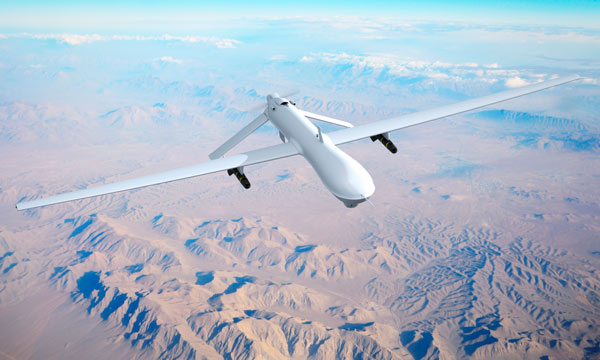

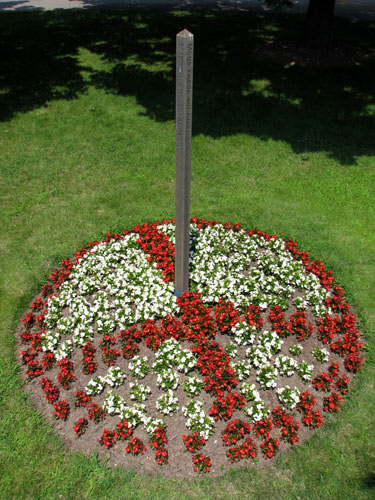
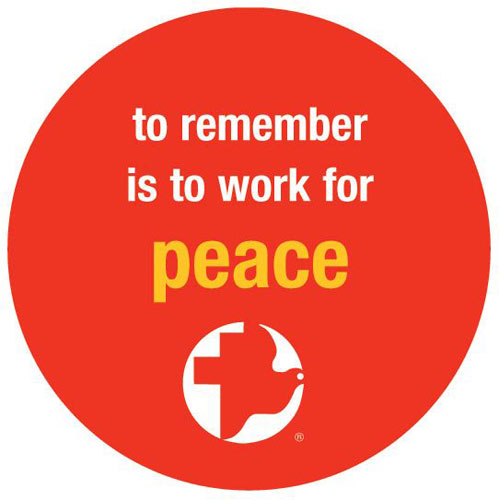
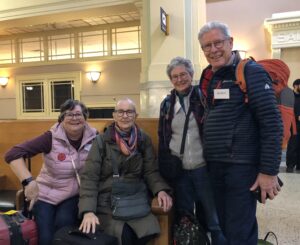
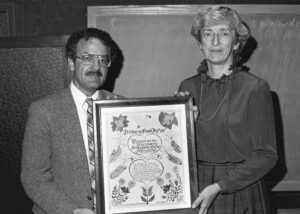
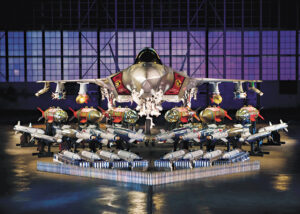

Leave a Reply
You must be logged in to post a comment.